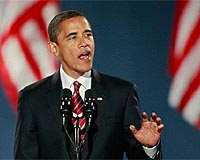| . |  |
. |
Brussels (AFP) June 11, 2009 NATO defence ministers on Thursday endorsed a plan for thousands of peacekeepers to leave Kosovo if security conditions can be assured, a decade after the air war against Serbia. The plan, NATO diplomats say, would see the KFOR mission cut to 10,000 troops from the current 13,800 by January, and fall to some 2,500 personnel over two years if a series of benchmarks are met. "Ministers decided today that the political and security conditions are right for a move towards a gradual adjustment of KFOR's force posture," NATO Secretary General Jaap de Hoop Scheffer told reporters. He said the contingent would move to a "deterrence presence", stepping back from the front-line security role it has held in Kosovo since 1999 to allow local forces to take the lead, backed by a European Union mission. Scheffer said the reduction, for which he declined to set any timeframe, will happen "in a gradual and phased manner, and each step will be decided by the North Atlantic Council (of NATO nations) based on military advice." The first cut "will be to around 10,000" troops, he said, and KFOR would in future be "a smaller force, relying more on flexibility and intelligence." As security concerns in Kosovo ease, and pressure mounts on the 28-member alliance to deploy to places like Afghanistan while faced with an economic crisis biting into budgets, nations have called for KFOR to be scaled back. But members remain deeply concerned about a possible rise in tensions in Kosovo, which broke away from Serbia in February last year, and NATO officials insist that they are not going to abandon it. "We will have at all times the manoeuvre forces and reserves at all times when we need them," Scheffer told reporters after chairing a working-lunch with the defence ministers. Danish Defence Minister Soren Gade also underlined that "there will still be a NATO presence and that's very important." NATO has been tasked by UN Security Council resolution 1244 to provide security since it launched a 78-day air war in 1999 -- a decade ago as of Wednesday -- to stop a Serbian crackdown on separatist ethnic Albanians. Albanian-majority Kosovo's independence is recognised by some 60 countries including the United States and 22 of the 27 EU nations. Serbia, backed by Russia, opposes the move, which they consider a breach of international law. One hurdle NATO faces is the fact that Belgrade and ethnic Serbs in Kosovo do not appreciate the 2,000-strong EU law-enforcement presence there: EULEX. The EULEX contingent is made up of more than 2,000 personnel, with legal, police and customs expertise. Spain, Britain and Lithuania have recently announced troop cuts in Kosovo. Denmark followed suit Thursday, announcing it would cut its presence from 354 soldiers to between 150 and 200 soldiers after February 2010. Madrid has not recognised Pristina's independence concerned that the precedent might encourage some of Spain's separatist-minded regions. NATO and particularly the United States continue to hold strong symbolic significance for the ethnic Albanians. "We owe gratitude to the officers and soldiers of the biggest military alliance, NATO, who by entering villages and towns of Kosovo 10 years ago, saved people's lives," Kosovo president Fatmir Sejdiu said in Pristina. "Therefore, the uniform of KFOR's soldiers is loved and respected by all citizens of the Republic of Kosovo regardless of ethnicity," he said, in an address marking NATO's deployment a decade ago. The NATO ministers, meeting over two days, will focus Friday on the alliance's troubled mission in Afghanistan, where troops from more than 40 nations are battling a tenacious Taliban-led insurgency. burs-loc/jj/lth Share This Article With Planet Earth
Related Links
 Commentary: Pie in the Muslim sky
Commentary: Pie in the Muslim skyWashington (UPI) Jun 5, 2009 After all was said and done, more was said than done. It was a fabulous speech, beautifully crafted, but it did not represent a sea change in the quest for a two-state solution to the perennial Palestinian problem. Freezing Jewish settlements in the West Bank is not the issue. Soaring rhetoric could not mask President Obama's modest strategic agenda. The paltry plight of Palestinian refugees ... read more |
|
| The content herein, unless otherwise known to be public domain, are Copyright 1995-2009 - SpaceDaily. AFP and UPI Wire Stories are copyright Agence France-Presse and United Press International. ESA Portal Reports are copyright European Space Agency. All NASA sourced material is public domain. Additional copyrights may apply in whole or part to other bona fide parties. Advertising does not imply endorsement,agreement or approval of any opinions, statements or information provided by SpaceDaily on any Web page published or hosted by SpaceDaily. Privacy Statement |